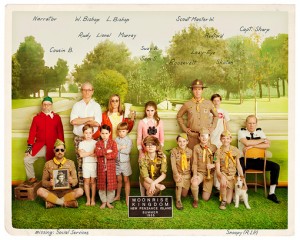Moonrise Kingdom
Posted on May 31, 2012 at 6:30 pm
 Wes Anderson films are not so much directed as curated. Often accused of being more interested in his props than his characters, Anderson’s fussy, even obsessive focus on the objects and sets gives his films a missing the forest for the trees feeling that seems claustrophobic and frustratingly precious to some audiences and astutely ironic to others. Some, I think, see both.
Wes Anderson films are not so much directed as curated. Often accused of being more interested in his props than his characters, Anderson’s fussy, even obsessive focus on the objects and sets gives his films a missing the forest for the trees feeling that seems claustrophobic and frustratingly precious to some audiences and astutely ironic to others. Some, I think, see both.
On a fictional island called Penzance off the coast of mid-1960’s New England, two middle school pre-teens run away partly to be together but mostly to be someplace different from where they were. Sam (Jared Gilman) is an owlish-looking orphan who escapes from “Khaki Scout” camp overseen by the very meticulous Scout Master Ward (Edward Norton). He wears glasses and a coonskin cap. He lives with foster parents who have rejected him and, as we find, after camp is over he will be sent to live in an orphanage by a woman so odiously officious the only name she goes by is Social Services (Tilda Swinton).
Suzy (Kara Hayward) is a serious and determined girl who lives with a family that does not appreciate or understand her. She wears knee socks, packs a record-player, and is very attached to her binoculars, which give her a chance to look at places far from home. Her mother (Frances McDormand) addresses her children in their home via megaphone. Sam first sees Suzy when she is in costume as a bird, about to appear in a performance of Benjamin Britten’s opera about Noah and the flood. They engage in a secret correspondence and make plans for their getaway.
Sam and Suzy create a world for themselves that is part fantasy, part very real. They are practical, if limited, in their understanding of their situation. Sam uses his camping skills to provide food and shelter, and they rename their site Moonrise Kingdom, establishing themselves as rulers of a place that exists in the opposite of the harsh daylight of their previous reality. They try some kissing but sleep next to each other in complete innocence. Suzy brought a record-player as one of her essentials, and they listen to music.
Meanwhile, Scout Master Ward, Suzy’s parents, and the local sheriff (Bruce Willis), who is having a joyless affair with Suzy’s mother, are searching the island for the missing children. Sam, who was ostracized for being weird by the other scouts, becomes a hero for his daring and romantic adventure and they help him try to escape with the assistance of another Scout leader (Jason Schwartzman) who is less upstanding than Ward. Even Ward ends up complimenting Sam on his “commendable” campsite.
Sam and Suzy may not have a plan for taking care of themselves past a few days and one of the things Anderson does best is conveying that exact moment between the end of childhood and the beginning of adolescence (Suzy’s home is called “Summer’s End”) when things are animated by imagination that can feel completely real. Like Peter Pan and Wendy, Sam pretends to smoke a pipe and Suzy presides over a group of Lost Boys to create a family that allows them to be both adult and forever young. Like the young heroes of Dickens’ story about Mr. and Mrs. Harry Walmers, Jr., the young runaways seem to have an almost incantatory faith in the power of marriage to create a bond that will protect them from the power of the grown-ups.
In many ways Sam and Suzy are more adult than the grown-ups around them, who are petty, foolish, or lonely. And, as usual in Wes Anderson films, they are not as fully realized as the props and settings around them. It is telling that the children assume a paper mache decoy will fool the adults; it almost does. Suzy’s library books in particular are a marvel of period detail, so vivid and evocative audiences of a certain age will swear they had those books on the shelf next to Madeleine L’Engle and Norton Juster. It’s details like the coonskin cap that delight his fans and infuriate everyone else. No one in the mid-60’s and no 12 year old of any era wore a coonskin cap. The omniscient “Our Town”-style narrator (Bob Balaban) can tell us a storm is coming but he cannot make the emotions of the story feel real or meaningful.
Parents should know that this film includes some sexual references and experimentation by middle-schoolers, teen and adult smoking and drinking, some strong language, some violence, and human and animal characters peril and injury.
Family discussion: Why did the scoutmaster change his mind about which was his “real job?” Why did the children run away? How does it change the story to have it set in the 1960’s instead of today?
If you like this, try: “A Little Romance” and “Fantastic Mr. Fox”


